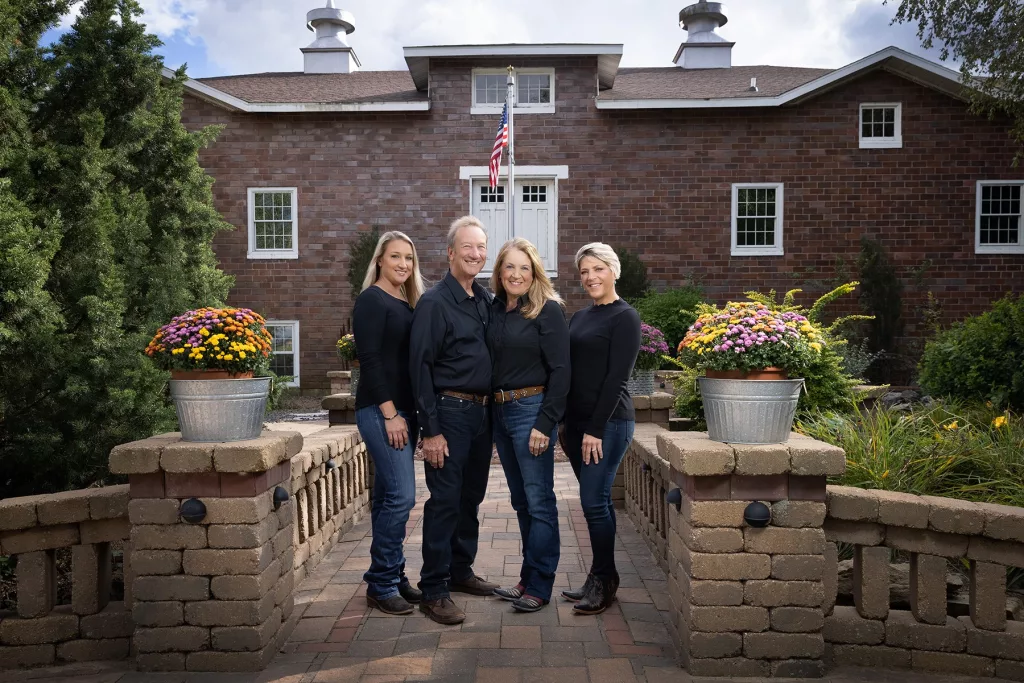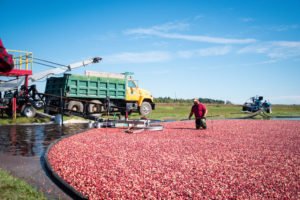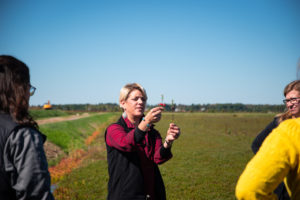
Gaynor Cranberry Company is proudly owned by the Dempze family, who have been growing cranberries in Wood County for over 140 years. Heidi Slinkman and her sister Jennifer Dempze are the fourth generation on the marsh in the Cranmoor township. Heidi affectionately refers to the pair of sisters as the “Gaynor Girls.”
As growers for Ocean Spray, 100% of their 200 acre crop is verified sustainable.
“We are one of the greatest American stories you have ever heard of,” shared Heidi.
Gaynor Cranberry Company was established in 1876 by a pair of Irish brothers. Heidi’s great-grandfather became the successor of the Gaynor brothers.
Cranberries are native to North America. The “Gaynor Girls” are proud to carry on the generational legacy of Gaynor Cranberry Company while contributing to Wisconsin’s ranking as the top cranberry producing state in the nation.
Gaynor Cranberry Company supplies cranberries for Ocean Spray. 100 percent of their 200-acre crop is verified sustainable.
“We absolutely value sustainability in all facets of farming and agriculture,” noted Heidi. “When I think of sustainability, I think of economics, the environment, the next generation, the people, the community, the resources, the wildlife. All of those components are absolutely valuable and necessary for us.”
For every one acre in cranberry production, Gaynor Cranberry Company owns another six acres of support land. This land serves as a wildlife habitat and supports essential pollinators.
Cranberries do not self-pollinate. Bees are brought to the marsh to support pollination. The health of pollinators is essential to the success of the cranberry crop.
Responsible water use is a priority at Gaynor. The team uses water-efficient technologies to ensure vines receive nutrients at the right time, in the right amount for berry growth and protection of water resources.
Cranberries are a perennial plant, and irrigation is utilized to protect the plant from frost. By protecting this year’s berries, growers are also protecting next year’s crop
Water is used to harvest the state fruit. Cranberries float to the water’s surface due to four hollow air pockets inside the berry.
“We work smarter, not harder,” remarked Heidi. “When we float the berries, they are easier to collect.”
Water is a tool in the cranberry grower’s toolbox.
The team at Gaynor Cranberry Company responsibly uses water by only using as much water as they need. Water is a resource that is borrowed and shared with neighbors. Clean water is valued on the marsh because their families drink, play and swim in the water.
To be economically sustainable, Gaynor Cranberry Company balances labor and machinery. The marsh’s employees are treated like family.
“Our people and our community are our greatest assets, and so is the land we are preserving and continuing to farm on,” said Heidi.
Cranberry growers are precision farmers. At Gaynor Cranberry Company, they are always trying to use the best management practices to be efficient with the berries. Equipment must be gentle with the fruit and be able to harvest quickly.
Cranberry harvest equipment is very specialized. Cranberry growers are self-made engineers, designing and investing for themselves.
Food safety is a top priority at Gaynor Cranberry Company. Heidi holds her team to high standards and has strict guidelines and expectations to maintain a clean, healthy product. They work hard to keep the marsh clean.
The fruit from the Dempze’s family farm travels a short distance to the Ocean Spray plant in Wisconsin Rapids to be used for craisins, juices or concentrate.
When the berries arrive at the facility, Ocean Spray can determine the best use for each berry. Berries that are not used for human food can be recycled as feed for pets and cattle.
The cranberry industry is a strong part of Wisconsin’s heritage and economy. The Dempze family realizes that in order to preserve that legacy for years to come, they must foster sustainable farming.
Heidi believes a cranberry bed is one of the most beautiful places in the world. The marsh supports an incredible amount of bird life, from bald and golden eagles, to whooping and sandhill cranes, owls, loons, and songbirds. They take pride in keeping their farms healthy because they are directly tied to the environment.
“We work and live on the land,” shared Heidi. “The relationship with the land is highly valued. It’s easy to talk about because it’s something we have always done.”



